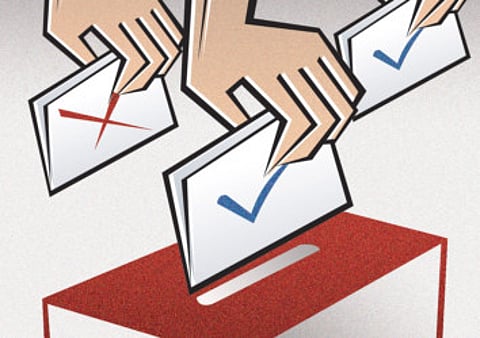Let Tunisia be an example for entire Arab world
Tunisia debunks the claim that Arabs cannot embrace democracy

How many times have you heard the expression: “What Arab Spring? It’s the Arab winter! The Arabs and democracy are incompatible!”? Usually you hear it from Arabs, expressing their bitter disappointment with the severe reversals that have eventually gripped what was a promising beginning in 2011.
It was in Sidi Bouzid, Tunisia, that the Arab Spring sprang, when a desperate, downtrodden Mohammad Bouazizi decided that he had had enough humiliation and that self-immolation was the only option left for him. And it was also in Tunisia that Arab democracy has now established its bridgehead, with the passage of an exemplary constitution, described as one of the most progressive in any Arab nation. How did the Tunisians, after a lot of haggling, bitter rivalry and assassinations of two left-wing politicians, manage to transcend their ideological differences and forge a consensus that was absolutely essential to write such a constitution?
It was not easy. It took a lot of courage, enough sacrifice, true leadership and many weeks of work, meticulously writing and re-writing documents, until everyone found it acceptable. Above all, it took a lot of listening from the other side — something sadly lacking in the Arab world and outside it too. In this manner, Tunisians brought into government a moderate Islamist party sharing power with two secular parties. Coalitions are never easy to form in any part of the world. The Tunisian President, Munsif Al Marzouqi, in his address to the nation said: “By adopting the constitution, Tunisia celebrated a triple victory — over dictatorship, over terrorism that seeks to spread chaos and block our path to democracy and over our own divisions.”
Tunisia’s image abroad has brightened, bringing praise from the French President Francois Hollande who said: “Islam is completely in line with democracy.” The United Nations Secretary-General, Ban Ki-moon, urged Tunisia to “continue to inspire the world, as they did some three years ago, and serve as an example for dialogue and compromise”.
Given the political strength of the Al Nahda party in that mix, it was a very shrewd and effective strategy of the group to ensure that the new constitution, while recognising Islam as the country’s religion, also enshrines freedom of conscience and belief and gender equality in a very patriarchal region of the world. One could speculate, in this context, whether the pressure was on Al Nahda to compromise because it did not wish to face the same treatment meted out to the Muslim Brotherhood in Egypt a few months ago. And now, the president of Libya’s parliament is full of admiration. Nouri Abu Sahmein said that “Libya intends to follow the same path,” despite the fact that the country is struggling to begin to elect the commission needed to write a constitution. Thankfully, it avoided the term “Islamic State”, with its obvious implications, and steered away from granting supremacy to Sharia — something that must have needed a lot of discussion and convincing those who would have wanted such language incorporated in the constitution. Instead, it says “Tunisia is a free, independent and sovereign state, Islam is her religion, Arabic her language and republic her regime”. One of the best sections, in my opinion, is where it states “Tunisia is a state of civil character, based on citizenship, the will of the people and the primacy of law”. “Based on citizenship” is that music to one’s ears that we should insist on. Religion should have nothing to do with it.
When, as in many Arab and non-Arab countries, a military or civilian ruler continues to rule for three decades, it imprints its indelible mark on the thinking and behaviour of the nation, especially when there is no critical media and when dissent is brutally suppressed. After all, 30 years is more than an entire generation, especially in the Arab world. The way the regime conducts business soon becomes the norm, first tolerated, then accepted and even approved by the people. Perhaps what helped Tunisia is the residual influence of Habib Bourguiba, the architect of Tunisia’s independence and its first president, who was also in power for 30 years (1957–87) and was one of the major voices of moderation and gender equality in the Arab world.
As secretary-general of the International Academy of Constitutional Law in Tunis, Gazi Gerairi said: “It is a result of consensus and this is new in the Arab world.” Hollande, during his visit to Tunisia to celebrate the new constitution, put it this way: “You have an obligation to succeed for yourselves and for all the other countries watching you. Tunisia is not an exception. It is an example.” Are other Arabs listening?
Dr Qais Ghanem is a retired neurologist, radio show host, poet and author. His novels are: Final Flight from Sanaa and Two Boys From Aden College. His latest co-authored non-fiction work is My Arab Spring My Canada (Amazon.com) and his combined English/Arabic poetry book is From Left to Right. Follow him on Twitter at www.twitter.com@QaisGhanem
Dr Qais Ghanem is a retired neurologist, radio show host, poet and author. His novels are: Final Flight from Sanaa and Two Boys from Aden College. His latest co-authored non-fiction work is My Arab Spring My Canada (Amazon.com) and his combined English/Arabic poetry book is From Left to Right. Follow him on Twitter at www.twitter.com@QaisGhanem


